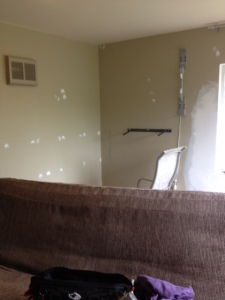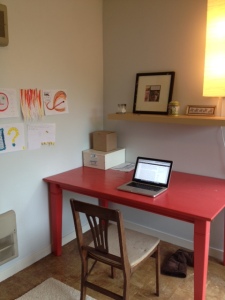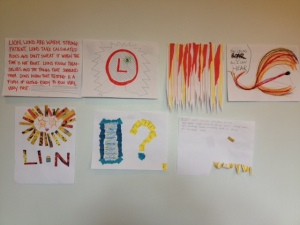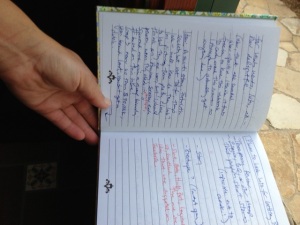**Note! Special offer for writers interested in my Saturday, March 19 workshop Releasing Your Body, Revealing Your Story in Oakland (1:00-3:45 p.m. at Flying Studios at 4308 Telegraph Ave.) Bring a friend, both of you get $10 off the workshop fee. Email me through the contact page on this blog or contact Sandra at sandrakstringer@gmail.com to register.**
—
I’m really excited about this upcoming workshop I’m teaching with my friend Sandra Stringer on March 19th in Oakland: Releasing Your Body, Revealing Your Story: A Writing and Movement Workshop for Writers.
 I’m excited because I’ve been ruminating a lot on the nature of fear, and how it prevents us from doing good creative work. Truthfully, I feel like the thing that hinders me is more like procrastination, and grading papers, and parenting, but nonetheless I think it’s all of a piece: I get tense in my body and in my mind because of work, social, and familial obligations, and I worry that I won’t get everything done, so I act frantic, and then I don’t carve out enough space to write, and then I feel bad, and then I can’t work because I feel bad, and then…
I’m excited because I’ve been ruminating a lot on the nature of fear, and how it prevents us from doing good creative work. Truthfully, I feel like the thing that hinders me is more like procrastination, and grading papers, and parenting, but nonetheless I think it’s all of a piece: I get tense in my body and in my mind because of work, social, and familial obligations, and I worry that I won’t get everything done, so I act frantic, and then I don’t carve out enough space to write, and then I feel bad, and then I can’t work because I feel bad, and then…
Sound familiar?
Anyway, it goes something like that, and I’m excited to do a workshop where we simply slow down for a couple of hours, let the body do its thing (e.g., release), and see what happens. I realize, in fact, that I’ve been craving this kind of time to just be still for several weeks. This is always a busy time of year; the papers-to-grade seem never-ending, spring break is fast approaching, somehow we’re supposed to plan for summer already (!), and we’ve had family visiting and more family coming. (I love seeing them all, so much, and it also means that I lose some writing time.)
So it should be a good afternoon.
In preparation for the workshop, I’ve been reading the famous book The Artist’s Way, which I’ve heard of for years but never picked up. The book is full of interesting practical ideas and an overarching theory that some would probably find a little too much: this notion that, to be an artist, writer, or creative person generally you need to put your faith in some kind of higher power. It’s all a bit 12-steppy, and yet, and yet—there is something about it that really resonates with me. Julia Cameron, the author, talks about the divine plan and how creativity works through us, like God working through us, and how, in a sense, you just need to make yourself receptive and then do the work and then, poof, it will all work out: you will become a creative and successful person. If you’re not religious, it might sound crazy (and I am not, so at first it was a little alarming for me), but it echoes notions of creativity that seem to be finding me everywhere these days: in this terrific Radiolab episode featuring Elizabeth Gilbert, and in a TED talk she did a few years back, both of which, when I first listened, absolutely blew my mind.
In a nutshell, Gilbert suggests that creativity is something outside of us, that creativity finds us, like a muse, or a little floating angel, as long as we’re open and receptive to it. There is something very anti-Puritanical about this notion! I, personally, was raised to work hard and not to expect too much. But for Gilbert, and Cameron, there is this belief that if you’re a good and dogged creative person, if you put the words on the page again and again and again, the universe will reward you with little gifts: a first chapter, a beautiful painting, the faith to keep going.
Whether you believe it or not, it’s kind of comforting, wouldn’t you say? It reminds me, actually, of my decision to name my chapbook Faith a few years back. I was obsessed with the word; it cropped up for me in everything I wrote. I think my entire notion of “faith” at that time centered around the belief that the words would keep coming, that things would work out if I kept at it. And in a way, I guess that’s what Julia Cameron and Elizabeth Gilbert are trying to say.
I hope, in my way, to bring some of that wisdom to the workshop the 19th.
Enough philosophizing for today; I need to go get some work done.
But I hope to see some of you at my workshop on the 19th, and, as ever, I’d be terrifically grateful if you spread the word to anyone else you know who might be interested. Note the special offer for bringing a friend! ($10 off for both of you.)
Faithfully,
Susie





